8+ Event Project Plan Templates – PDF, Word
Parties, benefit concerts, fun runs, festivals, business conferences, and gatherings are just a few events that can give even the most capable individuals a crazy fit or make them nervous, months before the big day. We enjoy the food, music, meeting people, being able to help a cause that comes with the event project plans most of us like to attend, but few people know the amount of effort and planning template it took to make it happen, not to mention making it successful. You may also see plan samples.

Sample Event Planning Timeline
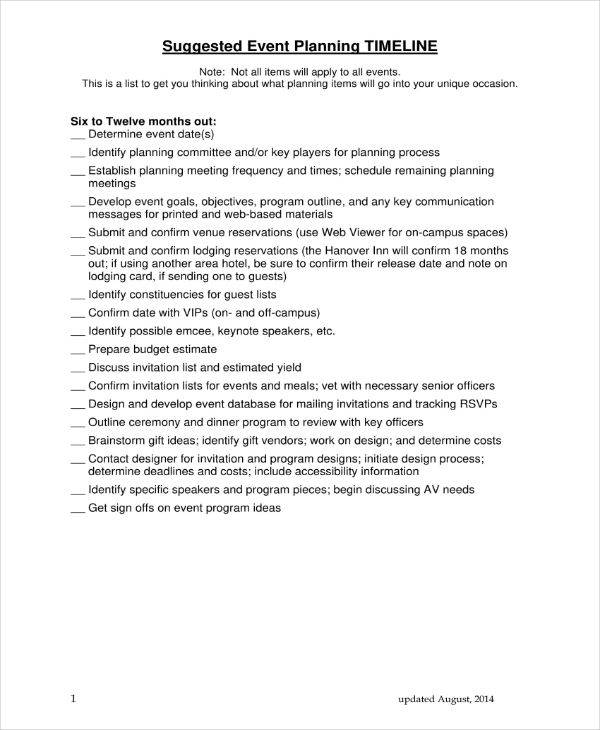 dartmouth.edu
dartmouth.eduProject and Events Management Sample
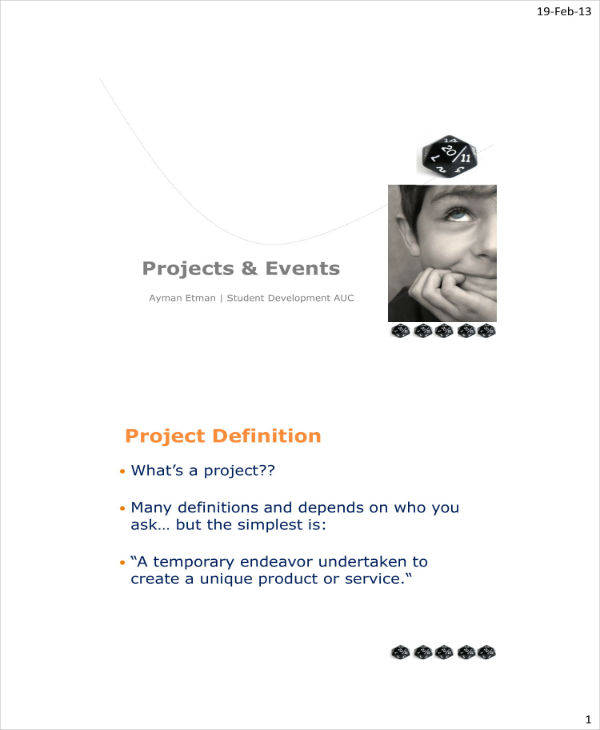 documents.aucegypt.edu
documents.aucegypt.eduLaunch Event Planning Proposal
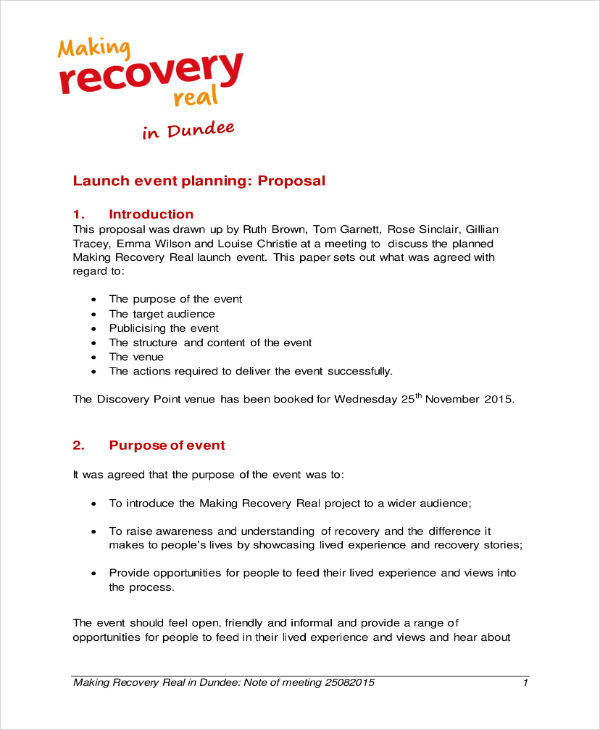 dundeecity.gov.uk
dundeecity.gov.ukYou only see the finished product. You don’t know what happens behind the program, entertainment or the activity we have been invited or registered to be part of, but the same goes for everyone else. Events go beyond the menu, drinks and the prominent people you get to see for a day or a night. It requires proper planning to have a successful event project brought to life, and if you don’t realize that yet, you will soon do when your company or organization puts you in charge of one. You may also see project plans in excel.
How to Make Your Event Project Successful
Did that scare you? Hopefully not, because believe it or not, with the sample plan and the resources to go with it, you might just be able to pull off the first ever event you organize. Like most things, for it to be successful, you need backup, and the backup you would have in your team. An event cannot be done by one person alone. Tasks have to be delegated and that should be one of the most important parts of your project plan.
1. Branding Your Event
One of the first parts of your simple project plan for the event is thinking of a compelling theme to make it stand out. You can’t just have another benefit concert. You can’t just decide to have a dinner for a cause and call it a plan. You and your team would need to choose something that hasn’t been seen or heard of yet with the competition. This would involve coming up with a theme or activity that is generally dynamic. You may also see event action plans.
This also means you have to be very careful in choosing the name of your event since it can be a game-changer in getting your target audience’s attention, especially when they see it being talked about online, especially in social media networking sites. To brand your event, you have to do these things: You may also see Project Plan Templates
1. Brainstorm names for your event. In your brainstorming, you have to consider what makes your event unique and what sets it apart from other events in your industry or sector. You may also see project execution plan templates.
2. Create a tagline. What kind of message do you wish to send to your audience by organizing this event? Your event is also a great way to make a strong statement through creating a tagline. After coming up with the name of the event, have a tagline that’s short, hard-hitting, memorable and one that would serve as a branding slogan that would perfectly describe what the event is all about. You may also see best project proposal plan templates.
3. Design a logo. The last step will be making a logo design that represents your event. This is a good chance to market the event since it’s also an effective branding tool which provides faster recognition of your event across all publicity promo materials such as t-shirts, water bottles, bags, key chains, etc. You may also see Plan Samples.
2. Create a Master Plan
Having a master plan should cover all areas of the event including:
1. The venue, logistics, and management of catering and bar services along with all the paperwork involved such as permits, insurance, and contracts. You may also see project plans.
2. Presenters, masters of ceremony, speakers as well as identifying or confirming logistics management like registration staff. You may also see creating a project plans.
3. Event activities and entertainment
4. Promotion and publicity across various platforms online; web pages, online promotion and digital marketing. This also includes printed materials like events calendars, printed programs, posters, and signage.
5. Registration (online sign-up forms, on-site sign-in)
6. Management of event sponsorship and partnership with other organizations
7. Volunteer management
3. Choose and Establish Event Partners and Sponsorship
Once you decided to have an event, you should be able to think of organizations that you could partner with. If possible, check for nonprofit organizations with a cause that’s not that different from yours, if you are also working for a nonprofit. Or you can propose sponsorship to defray costs and possibly increase potential participation of the market you’re targeting. Involving other people or groups in your event allows you to maximize efforts in spreading the word and making the event a success. With that, you may want to consider the following points:
Look for corporations to sponsor or fund part of the event. Sponsorship can range from national organizations that might be interested in sponsoring a dinner buffet, offer a sum as a prize for an activity or a major silent auction item, to businesses in the area that could provide goods or services which the event needs such as flowers, decorations, food, gift bag items from their stock which in turn, would help them promote their products and services.
Partnering with local or community organizations who can offer a venue to use or assistance like security and additional staffing for the event. You may also see simple project plan templates.
4. Develop a publicity plan
You may be able to score the best act in town for music and entertainment or the most sought-after speaker but their names alone won’t make people attend and won’t guarantee a full house. You still need to do some work on publicity which would ideally start with an initial notice on your website, a little note in your company or organization newsletter, email to save the date and maybe some posters across the area too. You may also see sample project plans.
You then need to build to online and offline publicity, keep up with media relations and have an ongoing outreach registration. Get creative, but first, get on with your planning. Also, don’t forget that no plan would be complete without the post-event messages of gratitude, acknowledgments on articles about the event’s important messages for its audience or of fundraising success. You may also see project plan templates in Word.
Events Planning Example
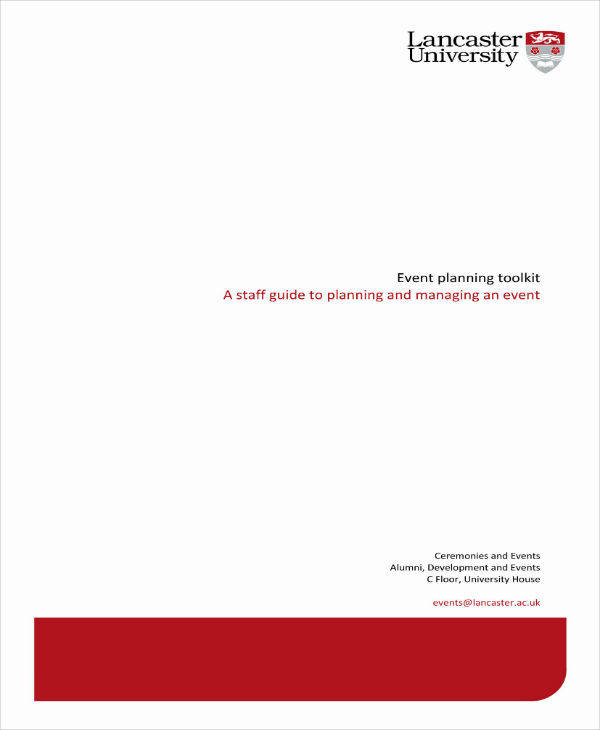 lancaster.ac.uk
lancaster.ac.ukEvent Project Budget Plan
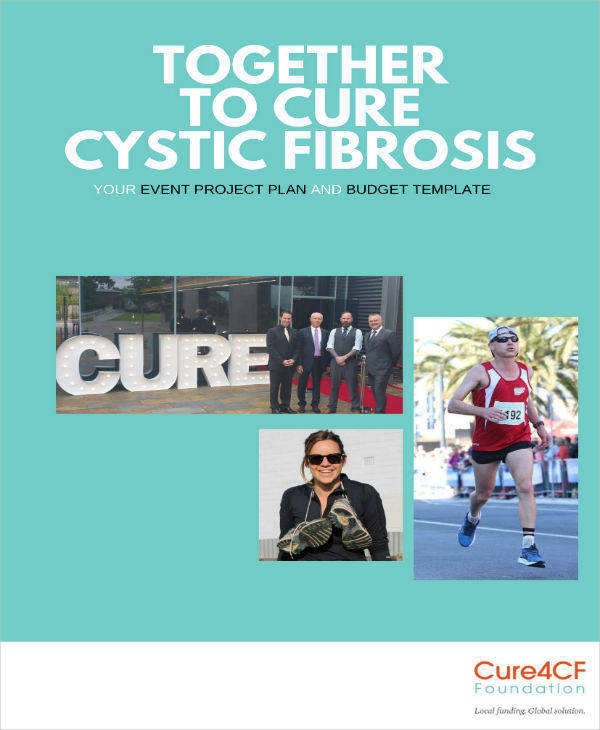 everydayhero.com.au
everydayhero.com.auBasic Considerations
How do you want your event to look and feel like? What kind of event or activity is it? Who is your target audience? Who will be attending? What or who is it for? It’s also important to think about what you’re hoping to accomplish as well as specific goals or results that you expect. Remember that your event should be able to encourage goodwill, anticipation, and enthusiasm about your organization. You should see an event as a great chance to strengthen relationships with employees or members of your organization and your stakeholders. You may also see project management plan templates.
1. Start Early
Your sample project plan should start right after you have been tasked to organize or manage it. If it’s going to be a large event, people would have big expectations and it’s something everybody in your organization or company would look forward to so you should really start planning six months before the target date. For smaller events, a month or two of planning would do, as long as you have enough people to help you with it. To have your final run of the event go smoothly throughout the planning process, make sure that all vendor contracts or agreements have been signed and completed a few weeks into the event.
2. Maintain Flexibility
Over the course of planning your event project, you can expect for changes to happen. Be it in the time and expected date of the event, the concept or the location, you need to ensure that you remain flexible and would be able to meet the event’s changing demands. Changes may happen, and you would need to adjust your resources and efforts to that. You may also see sample project action plans.
3. Negotiate When You Can
Vendors may tell you differently, but everything can be negotiated. For every event, there will be costs that you didn’t see coming, so try negotiating as low a price as you can. Before meeting your vendors, be ready with a simple budget you have determined with your accounting team and offer to pay 5-10% lower than the asking price. Of course, they may put up a fight but at the end of the day, they’ll want to do business with you because they know that a competitor will always be waiting on the wings who may agree to what you’re negotiating.
Event Planning Sheets Sample
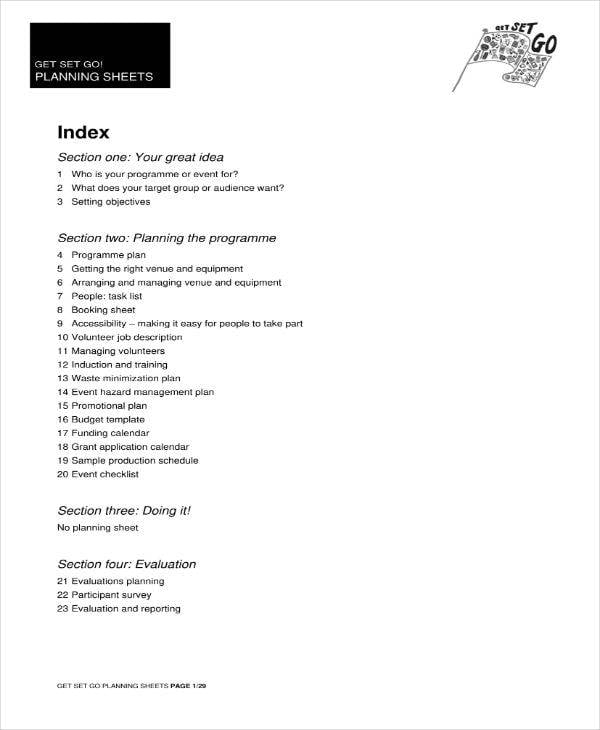 wellington.govt.nz
wellington.govt.nzEvent Planning and Project Management
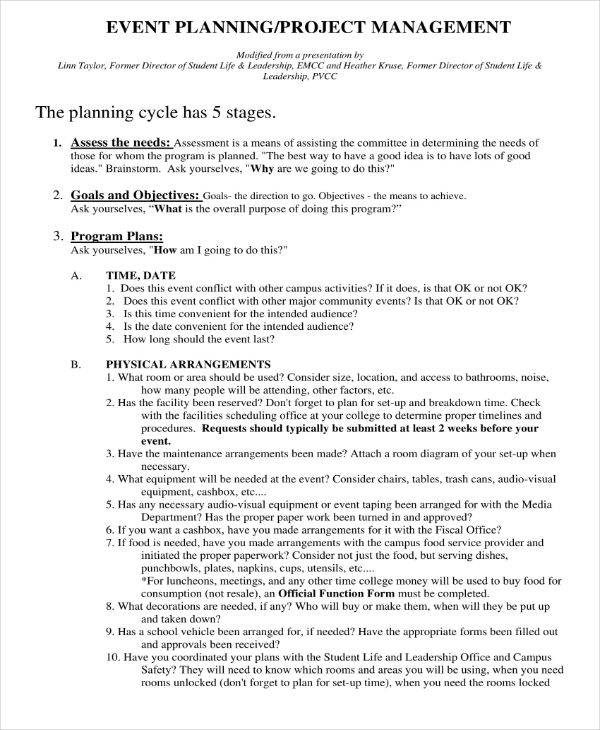 documents.aucegypt.edu
documents.aucegypt.eduEvent Management Plan Example
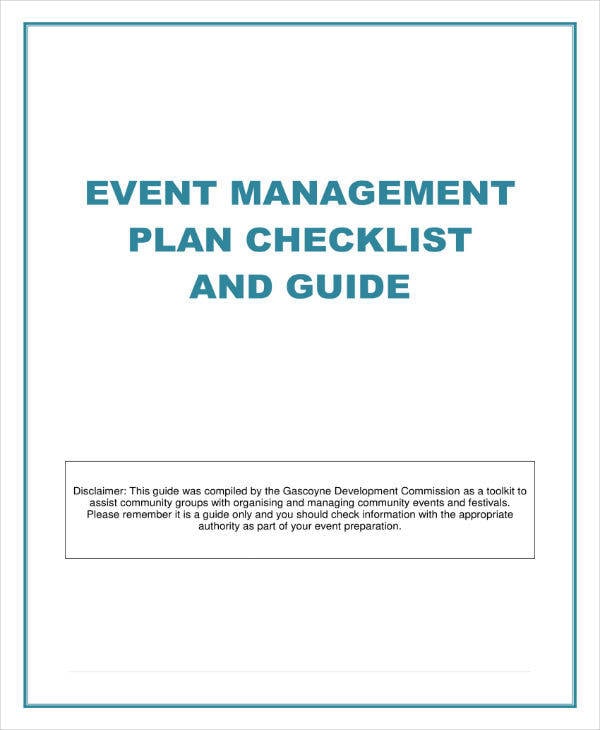 gdc.wa.gov.au
gdc.wa.gov.auEvent Management Planning Sample
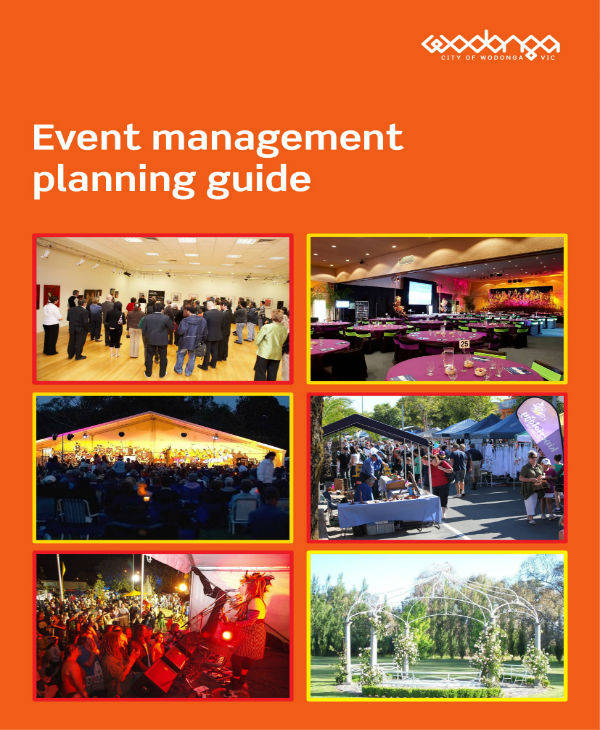 mesacc.edu
mesacc.eduDetermining the success of an event project doesn’t end when the event ends. Too many organizations make the mistake of taking a break after the event, especially if they managed to get their target audience and obtain the funds they needed out of it. You should always remember to acknowledge your sponsors, vendors, and partners because the word of success shouldn’t stop when the event stops. Doing so would earn a greater trust with your stakeholders and they would want to do future collaborations, partnerships, and sponsorship with you. You may also see project planning.






